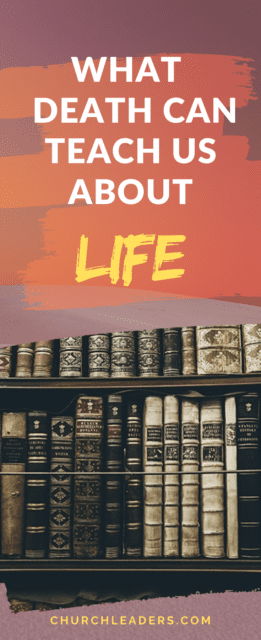The thought of death came too late for an American Civil War general and a Soviet head of state—will it come too late for us? When your body is lying in the coffin, when your life is being remembered, do you want your surviving spouse or kids or friends to think, “Everything he gave his life for was a fraud. It was wasted. But now, perhaps God will have mercy for him giving his life over to such useless aims, and still usher him into His eternal kingdom.”
Virtually every classic writer holds up the remembrance of death as an essential spiritual discipline. It will help us to live a life that is celebrated rather than mourned. “The man who is really concerned to live well must possess himself continually of the thought that he is not to live long.” 7
Making Death Our Servant
“David is dead,” my wife said. “His parents want you to speak at the funeral. They’re burying him tomorrow.”
I had spent the day with my kids at a local fair. We had been riding kiddie roller coasters, braving gravity-busting wheels, and digesting cotton candy. We got home late at night, and the funeral—a three-hour drive away—was scheduled to take place in about 13 hours. It was difficult, as you might imagine, to shift gears so suddenly.
The funeral was a particularly sad one because David died in prison. He poked heroin into his veins once too often, and on one occasion, the HIV virus was clinging to the needle. David developed AIDS and slowly wasted away. He was in his early thirties.
I tried to comfort his parents: “God knows what it’s like to watch a son die in his early thirties,” I said.
Lisa and I decided to take our children to the funeral. On the way, we talked to them about what we could learn from this sad passing. “If somebody tells you what you’re missing out on when you refuse to take drugs, I want you to remember this,” I said. “Think of a young man giving up the rest of his life, dying without a wife, without kids, locked inside a prison cell. That’s where drugs will take you. That’s what you’re missing when you say no to drugs.”
I struggled through the service, trying to find words to reach out to those who had come to say good-bye. “David is gone now,” my talk began, and I searched for lessons we could learn. The classic Christian writers helped me by teaching me that even tragic deaths can provide valuable truths—if not positively, then negatively. In fact, these writers urge us to use death by extracting the message out of each one, thereby making death our servant. Let’s see how the remembrance of death can serve us today.
Pure Perspective on the Remembrance of Death
Imagine a number of men in chains, all under sentence of death, some of whom are each day butchered in the sight of others; those remaining see their own condition in that of their fellows, and looking at each other with grief and despair await their turn. This is the image of the human condition. 1
In this quote, Blaise Pascal captured the reality of the human condition.
The remembrance of death acts like a filter, helping us to hold on to the essential and let go of the trivial. Climacus pointed out that a “man who has heard himself sentenced to death will not worry about the way theaters are run.” 2 His point, of course, is that all of us have been sentenced to death. It’s just a matter of time, so why let trivial matters captivate our hearts?
Eternity certainly does turn everything around. I’m reminded of this every year when I prepare my tax returns. During the year, I rejoice at the paychecks and extra income, and sometimes I wince when I write out the tithe and offering. I do my best to be a joyful giver, but I confess it’s not always easy, especially when I have other perceived needs and wants.
At the end of the year, however, all of that changes. As I’m figuring my tax liability, I wince at every source of income and rejoice with every tithe and offering check—more income means more taxes, but every offering and tithe means fewer taxes. Everything is turned upside down, or perhaps more appropriately, right-side up.
I suspect judgment day will be like that. The things that bother us now and force us out of our schedules—taking time out to encourage or help someone, for instance—will be the very things we deem most important. Today, we may not be too happy about having to skip a movie so we could paint an invalid’s house, or we may regret missing a meeting so we could visit a prisoner or sick person. But in eternity, the movie and the meeting will seem much less important, and we will be glad we took the time to do those acts of kindness.











